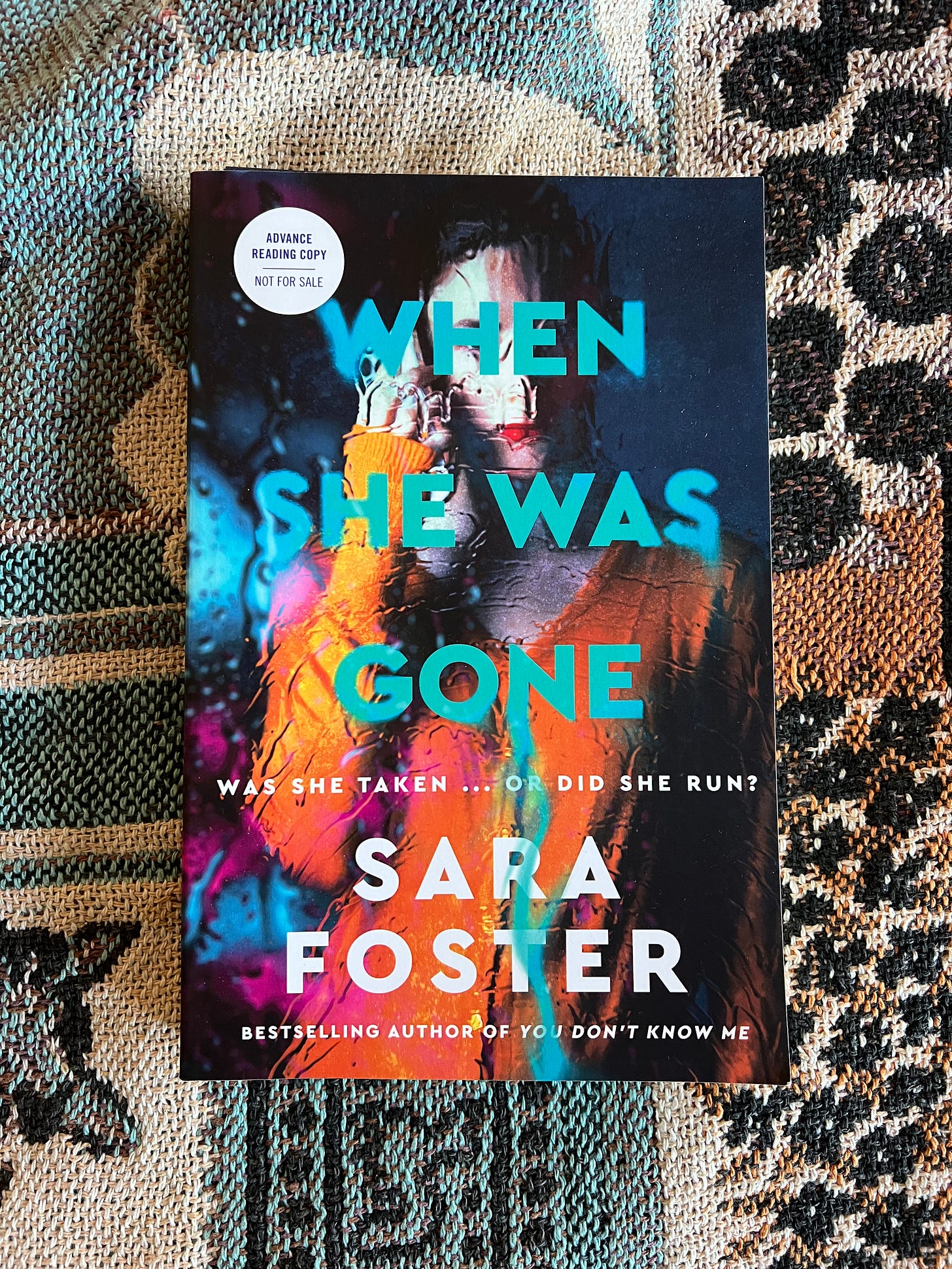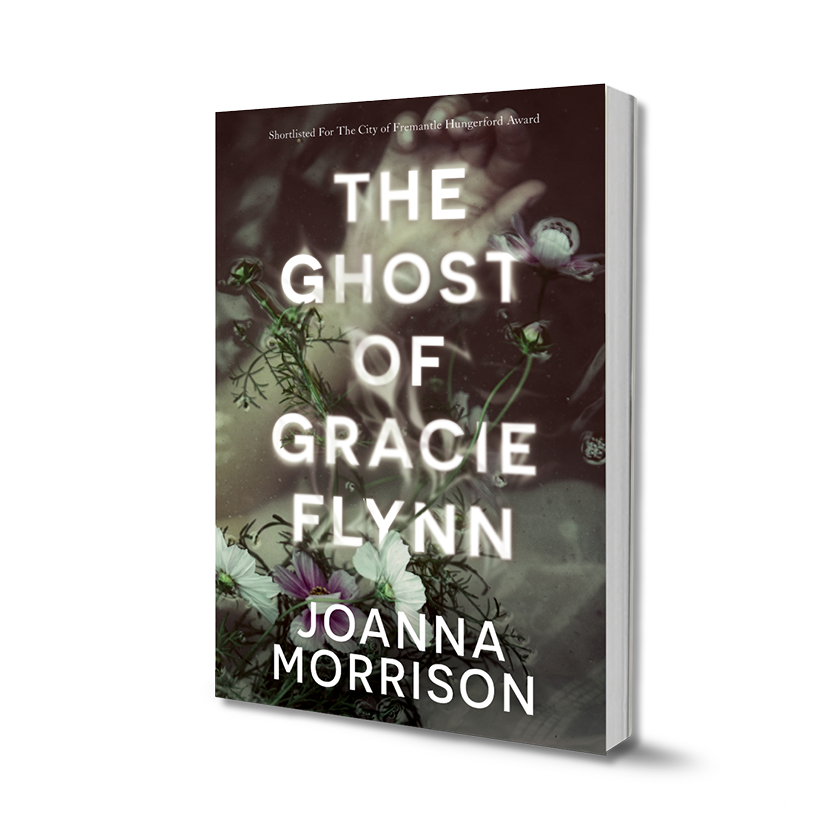Anatomy of a Thriller: Complex characters, latent violence, layers of conflict
Sara Foster answers my questions about her latest novel, 'When She Was Gone', a race-against-time thriller exploring misogyny, wealth, power, and control.
Every so often, I’m invited to interview guest authors at Open Book by owner Jessie Hilton. It’s always a delight. I love getting to brush off my journalism skills and celebrate new books coming into the world, and thanks to Jessie, I’ve been allowed to pick the brains of Dervla McTiernan, Ros Thomas, Natasha Lester, Polly Phillips, Amy Taylor, Laura Elizabeth Woollett, Karen Herbert and Michael Levitt. Always in front of engaged readers and surrounded by books. It’s such a privilege. Nerve-wracking sometimes, but so energising.
Earlier this month, we had Sara Foster in the hot seat, discussing her new thriller, When She Was Gone. Sara and I had a great chat about her research process, what makes for a good thriller, and the themes she tackles in When She Was Gone. I wanted to share the good stuff here on The Jam, but I don’t have the tech to record live interviews with good sound quality, so I asked Sara if she’d answer some written questions for us instead. She was kind enough to oblige, so here we are! Enjoy.
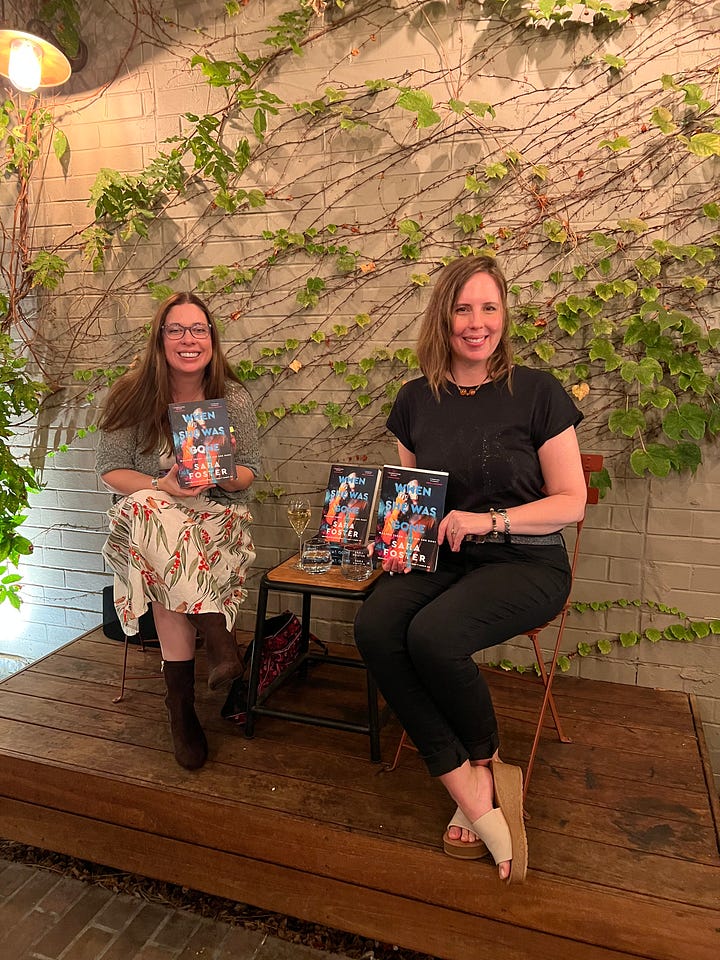
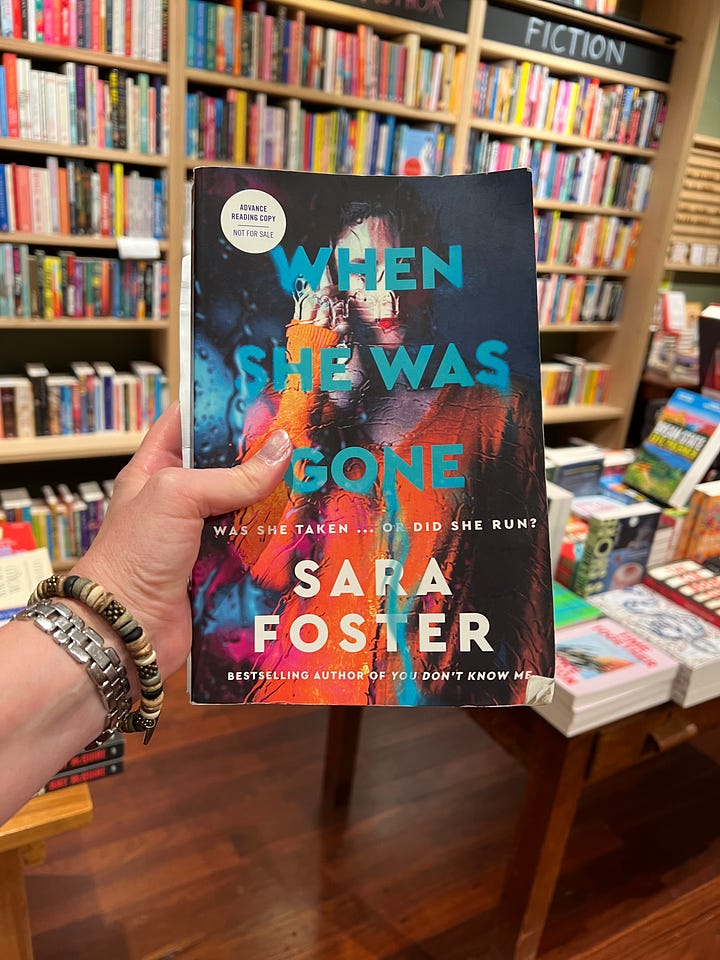
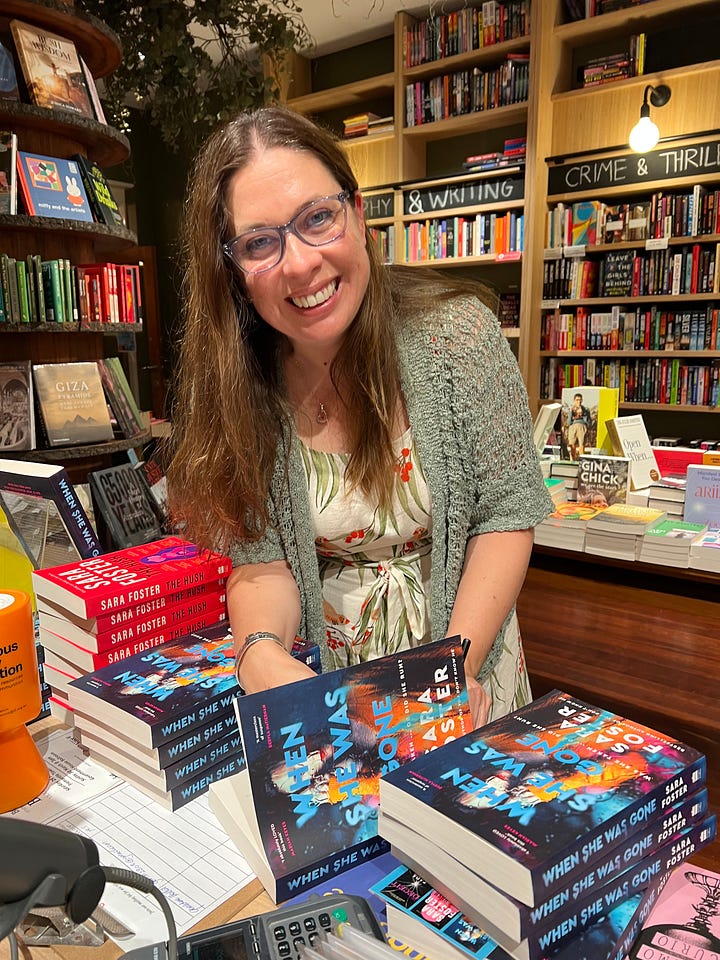
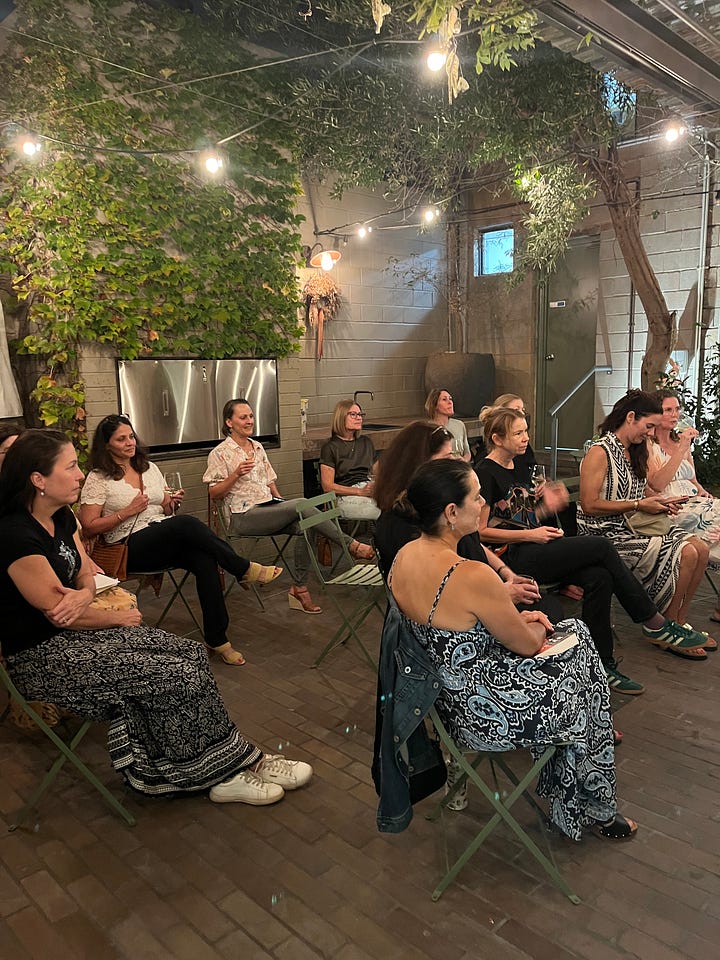
Author Bio:
Sara Foster writes page-turning psychological suspense thrillers with strong female leads, including acclaimed dystopian thriller The Hush and seven other bestselling novels. Two of her novels have been optioned for television, while one of them, You Don’t Know Me, has been adapted into a chart-topping drama podcast series. Sara has a PhD in Creative Writing, studying maternal representations in fiction. She lives in Perth, Western Australia, with her husband, two daughters, and a small menagerie of pets. Sara has two Substack newsletters: one for readers — Story Matters — and one for writers — The Resilient Author.
Book Blurb:
Former London police officer Rose Campbell has been estranged from her daughter, Lou, for almost a decade. But when Lou disappears from a remote Western Australian beach, and the police suspect her of kidnapping the two young children in her care, Rose is asked to help bring Lou home. The police think Rose’s insights will lead them to Lou, but they don’t realise that Rose hardly knows her daughter any more.
This is the final case in DSS Mal Blackwood’s illustrious career, and there’s a lot riding on it. The missing children are heirs to the Fisher property empire, and while their multimillionaire grandfather is breathing down Blackwood’s neck for results, the media storm is intensifying. Faced with a deluge of evidence and accusations, Blackwood doesn’t know who he can trust.
Rose arrives in Australia intent on proving her daughter’s innocence, but how can she be sure of that when she’s no longer part of Lou’s life? Meanwhile, as Blackwood begins to expose the Fishers’ secrets, the investigation takes a much darker turn. Shadows of the past gather around the Fishers and Rose, and soon it’s clear that every hour is critical. What has happened to Lou and the children? And can Rose and Blackwood find them in time?

Q&A:
Thanks for joining me, Sara!
When British au pair Louisa and the two small children in her care vanish from a remote West Australian beach, Louisa’s estranged mother—former London police officer Rose Campbell—flies over to represent the family. Can you tell us about this mother-daughter relationship?
Rose and Louisa have a very unusual mother-daughter relationship. When Louisa was still a baby, Rose was involved in a very traumatic incident and suffered from PTSD in the aftermath. Her partner Henry was not sympathetic and took Louisa to Scotland and remarried. Following this he worked deliberately to keep Rose and Louisa apart. So by the time Louisa vanishes from the beach with the two young children in her care, she’s in her early twenties, and Rose doesn’t really know her child anymore. However, this doesn’t mean either of them have stopped caring. And in the intervening years, Rose has got her life back together and now has extensive experience as a police officer, a hostage negotiator and more recently as a domestic violence expert, so when she comes over to help the search for Louisa and the children she is uniquely placed to be able to provide insight into this case.
Rose Campbell might be a former police officer, but she is not the detective in charge of this case. She steps into the gaps left by Detective Mal Blackwood and his team. Can you tell us a bit about Blackwood and where he came from as a character?
I loved writing Blackwood because he’s at such a crossroads in his life. For most of his working life, his identity has been completely tied to his career, but now, because he’s on the verge of retirement, that has to change. In addition, his wife walked out a couple of years ago and it’s taken a long time for him to win her back, and he’s since had a few health problems. So now he’s been asking himself a lot of questions about where he’s put his time and his values over the course of his life, and he’s trying to be more present in his marriage – but he’s also perfectly suited to lead this case and he knows how much he’s needed. Therefore, he jumps in, desperately hoping that he’s not about to destroy all the hard work he’s been putting into his personal life, and finds himself immediately challenged by both Rose and the powerful Fisher family.
In relation to the wealth and power themes explored in this book, can you tell us about the family the missing children come from, and how this raises the stakes, or at least ratchets up the pressure on the police force investigating the case?
When I first imagined Louisa going missing with the two children in her care it didn’t take me long to realise that I could really up the stakes by making those children’s roles more significant in some way. I knew that this kind of case would be likely to attract a lot more attention if the family of the missing were well known, and it was also a perfect opportunity to introduce more layers of conflict into the story, because the Fishers are used to getting their own way and being able to make their money work for them. So they come into the scenario with all kinds of preconceived ideas about how to fix this situation – and of course, none of it is likely to work, so they end up causing a lot of chaos instead.
I’d love to know how you researched the police-procedural aspects of When She Was Gone. Do you have connections in the force or have you ever, say, tagged along with a police officer investigating a crime?
I would love to tag along with a police officer investigating a crime but I haven’t been lucky enough to do that yet. However, I do have a good friend in the WA police force who was also a young officer in the UK at around the same time as Rose would’ve been working in London, so I was able to pick her brains extensively, for which I’m truly grateful. I’ve already consulted with her on a lot of my stories and her help is always invaluable.
Rose has worked in domestic violence cases as a police officer and subsequently as a bestselling non-fiction author. Gender-based violence rears its head in a variety of nuanced ways throughout the book. Can you tell us how you approached this complex theme in the book?
I think we often hear, via the media, about the most brutal and horrific moments of domestic violence, but I also wanted to explore the many layers around that and how long it can take for a relationship to reach the point where it turns explosively violent. I also wanted to look at the latent violence running through different kinds of relationships, suggested through the characters’ words and actions, and to present a few different scenarios and stages of violence to contribute to the conversations and discussion in this space.
Your protagonists tend to be strong women, and Rose certainly fits this bill. She’s been through a lot, and her coping mechanism of repressing her emotions can make her seem cold. This makes her vulnerable to being judged by the media and the public, especially considering her estrangement from Louisa. Where does Rose fit, in relation to other mother figures you’ve studied as part of your PhD on maternal representations in fiction?
My academic work looked specifically at mothers in dystopian stories with young adult heroines (such as The Hunger Games) because mother characters are frequently made absent in a variety of ways and for a number of reasons, most often to give young characters more agency in the narrative. However, I was interested in the effects of that on both the young characters and young readers – because what are we telling them about their future selves if we invariably sideline the older women in our stories. My studies have made me want to try to represent mothers differently whenever I can – and I’m aware that if I hadn’t centralised Rose in When She Was Gone, then she would’ve been seen as the absent mother in Louisa’s life. By giving her a narrative I’ve hopefully provided readers with a completely different insight into who she is, and why she hasn’t been able to be there for Louisa.
What do you think makes for a strong thriller?
Finding that enigmatic combination of pace, memorable characters/place and exciting plot. It’s one thing to think of a compelling hook for a story but it’s incredibly hard to make that work effectively over the course of 90,000 words.
Are you a fan of detective shows on TV? If so, what’s your favourite?
I do love detective shows although I feel like I have a lot to catch up on at the moment. I think the show I’ve loved the most in the last decade is probably Broadchurch - I really enjoyed the procedural side of the murder investigation and the relationship between Olivia Coleman and David Tennant’s characters, but the story expands and lets us get to know a lot of the characters in the town – and the twist in series one is magnificent. I also love Happy Valley with Sarah Lancashire – her police officer character is brilliant and imbued with northern English realism, taking me back to my roots!
What would you say was the most difficult part of writing Where She Was Gone? And the most enjoyable?
I think the most difficult part was probably the editing process as it went through a number of edits and it’s always challenging to try to keep enough of a fresh eye to do effective work. However, I still feel incredibly connected to the characters of Rose and Blackwood - and I loved getting to know them and their stories. Hopefully one day I might get to revisit them!
Let’s hope so! Thanks so much for joining me, Sara. Wishing you all the best with this novel, and the next one up your sleeve.
And thanks to all of you for reading. Until next time!
Is there an author you’d like me to interview here on The Jam? Or a burning question you have for authors that no interviewer ever seems to ask? Let me know!
Next month, I’m thrilled to be launching Jay Martin’s new novel, Boom Town Snap, with Fremantle Press. This one will be at the Walyalup Civic Centre in Fremantle. May 8, 2025. 7.00pm—8.00pm. Read about it here.
Thanks for reading ‘The Jam with Joanna Morrison’! Subscribe free of charge to receive new posts and support my work.
‘The Jam’ is a newsletter for readers, writers & story-lovers. I’m Joanna Morrison, a writer based in Western Australia. My first novel The Ghost of Gracie Flynn (Fremantle Press, 2022) was shortlisted for the Hungerford Award in 2020. My manuscript ‘The Wanting Dance’ was shortlisted for the Australian Fiction Prize in 2024. Visit my Linktree for links to my website, Instagram, media interviews, reviews, and ways to buy my book. Thanks for joining me!





